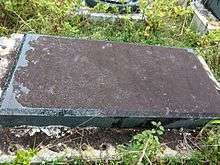M. D. Cockburn
Montague Dundas Cockburn (/ˈkoʊbərn/) (1788-28 September 1869) was a Scottish coffee planter, and district collector of Salem, in Tamil Nadu, India, between 1820 and 1829. Cockburn is known as the "Father of Yercaud" for developing the resources of the Shevaroy Hills,[1] and for introducing the cultivation of coffee, pears and apples into most of the hill stations of Tamil Nadu, particularly in Yercaud, a small hill station in Salem District.[2]

Cockburn helped in improving the coffee plantations in Tamil Nadu. While he was collector of Salem, he visited many hill stations, like Yercaud and Kotagiri, and it was when he visited Yercaud in 1820 that he introduced coffee plants from Arabia. Cockburn erected a small hut which is now known as Grange Estate. During the Indian Rebellion of 1857, the building was fortified to form a castle-like structure, and is an important landmark today. The first coffee estate in Kotagiri was planted by Cockburn in 1843, in Kanhutty. Catherine Falls, located 7 km from Kotagiri, was named after his wife, Catherine Jane Lascelles (died 30 August 1879).[3][4][5]
References
- ↑ Tejwant Singh (September 17, 2000). "Yercaud: The new hill station". The Tribune. Retrieved 2008-04-01.
- ↑ "Kotagiri". Retrieved 2008-04-02.
- ↑ Cotton, Julian James (1905). Inscriptions on tombs or monuments in Madras. Madras. p. 285.
- ↑ Playne, Somerset (1914) Southern India, its history, people, commerce, and industrial resources. The Foreign and Colonial Compiling and Publishing Co., London. scan page 240
- ↑ Eagan, J.S.C (1916) The Nilgiri Guide And Directory. The S.P.C.K Press scanned book